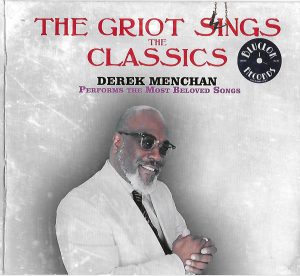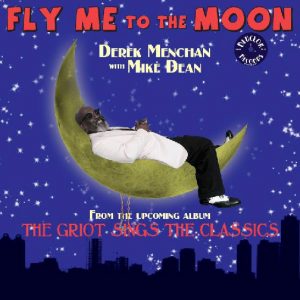Cultural Weekly’s Eileen Murphy recently caught up with music producer Derek Menchan. Here is their conversation.
Eileen Murphy: You’re the producer of the eclectic album The Griot Swings the Classics that’s already a big hit (#4 on Amazon’s Contemporary R & B charts). You’re a tenured professor of the Humanities at a Polk State College and organize and direct its Voices of the People, a (mostly classical) chamber music concert series. You’re also a multi-instrumentalist. How do you do it—keep all these balls in the air? What’s your secret?
Derek Menchan: Well, first off, thank you—yeah, the album climbed to a high of number 4 for a bit, about which I am really humbled. And I don’t think about my doing all these things ‘til it’s pointed out to me. But I’ve learned, when the motorcycle of inspiration comes my way, to get on it and ride, no matter what, no matter where it takes me.
And if there’s any secret, it’s that I’m really jazzed and grateful about having so many natural talents and abilities, and it’s my view that while you’re alive, you’re to work as hard as possible to maximize the talents you have; that’s all I’ve ever done.

EM: The album starts off with the fun song “One Mint Julep” and continues with two more upbeat, jazzy pieces. Included also are gospel songs and moody ballads. It’s truly an eclectic mix. What made you pick the particular works you did—the “Most Beloved Songs”—and what’s your take on “griot”?
DM: I picked the songs I did because my album is dedicated to my mother, who turned 89 this past December. There was no better gift I could give her, I felt, than an album of tunes she could dig, with some of her faves and mine on it that we could listen to and sing along with and my letting her know I did it for her. Well—fait accompli! We greet many a morn singing, laughing at, and (me) crying along with the album. That’s worth its weight in gold, to me.
The term “beloved” is just a doffing of my hat to the cats from the golden years of recording. Frankie sings the swingin’est tunes, King Cole sings the most lovely ballads—those were the types of phrases for album titles that were used in the ‘50s—the general era I re-imagine in my Griot project.
And a “griot” is an African historian or storyteller. I use it because I am not so much a professor as I am a teller of tales; all my lectures are delivered so as to make the students feel they are seated at a bar, near me, listening to me hold forth—In typical barroom parlance, I might add.
EM: Is there an intentional subtext to your singing and playing? For example, I love your arrangement of “When Jesus Came into My Heart.” It’s so over-the-top happy that it seems a little ironic, a little absurd. Am I right?
DM: Yes! “Since Jesus” comes from the happy shelf in my mind, my lovely hypomania. It’s the place whence Michelangelo found the inspiration to paint the Sistine’s frescos. When I am there, I can do whatever I want—have steel drums in a hymn, a ‘70s synthesizer line in a ‘50s big band chart, or a talk box quartet in a classical Latin jazz chart. And so there is a structure to what I do—one that opens itself up to excursions of delightful exploration and self-discovery.
If you notice, I have some absolutely ridiculous musical moments—featured in absurd orchestrations—principally because that’s how I hear them, but also because I have a commitment to serving the muse of absurdity. Though I think what Griot does is serious, it is quite important that I be stupid. I demand it, of myself!
EM: With a few exceptions, all of the voices on the album are yours. You have a great singing voice; its rich bass tones sound professionally trained—how did you learn to sing so beautifully?
DM: Thank you! My voice got honed by performing alongside great singers in recitals, jazz sets, and opera pits; I have dated a few singers. Everyone in my immediate family has always sung.
By hanging with great singers, I learned that, especially true of those who sing opera, they have seventeen senses, whereas we mere mortals have only five. I was able to pick up some of their powers to help me turn phrases and place notes.
Too, I grew up listening to the best in our home. If a dude wants a smooth voice to emulate, you can’t do much better than Nat King Cole. My dad and I used to sing duets of some of the lines King Cole crooned in his songs. “Ramblin’ Rose” comes to mind.
EM: You performed almost all of the instrumental and singing parts on the album. Plus you arranged and orchestrated the music. What was it like, being responsible for all of this?
DM: ‘Twasn’t nothin’ but a party, always! I feel totally free—when creating, and this leads me to one of my favorite quotes, by Stravinsky: “I feel the most free when imposing restrictions on myself.”
Thus, I decided to create a project that revolves around my wheelhouse and, so, willfully put on my bandleader hat. I feel I am a natural at arranging big band charts and other ensembles which feature a high degree of counterpoint because, of course, I was reared on Bach, Mozart, and Beethoven, and the boys. It’s only a trip across a few streets to get to Big Band and Bebop, you dig?
You must also remember, my keyboards (and, of course, super-geniuses like Marty Morell and Mike Dean, both featured on the album) are my “orchestra.” Here, I draw upon my forty years in the trenches as a symphonic musician and all those sounds I heard. All that data got downloaded onto the hard drive of my mind, and I can emulate and replicate them all.
EM: Do you have any “muses”? I heard you have a tattoo of Thelonious Monk—what’s up with that?
DM: I have many, many incorporeal muses—and some, corporeal…
…Count Basie, Sarah Vaughan, Quincy Jones, Duke Ellington; Bach, Mingus—and many more, some friends, some luminaries—and some priceless individuals I have met during my sojourn as a prof.
Dig it—I am turned on by the greenness of grass—the fact that humans can walk and talk, and create—that clouds can move—and so it doesn’t take much for me to be inspired!
Oh—and I’ve got ink of Monk on my arm, first, because I venerate him and his art, but now maybe I can channel him more seriously, with his visage on my body…
EM: What’s next for Derek Menchan?
DM: Man, I am a tabula rasa. I have wanted to do a sample-based project for a long, long while, and there are also some trend-setting cats out there that I would like to collaborate with and that seemed jazzed to work with me, too. I don’t plan to drop any more albums before at least a year, though. So, as my grandmother used to say, “Let’s just wait and see.”

Connections:
Purchase The Griot Swings the Classics
Purchase the single “Fly Me to the Moon” (and other singles from Menchan’s album)
Derek Menchan’s website: https://www.derekmenchan.com/
Related Cultural Weekly article: https://www.culturalweekly.com/music-in-the-wilderness/
Photos: Sanford Betz
